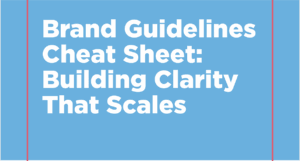At The Matchstick Group, we’ve seen firsthand how data and analytics can be a game-changer for medtech and medical device companies. In an industry that often faces complex regulatory environments, long sales cycles, and entrenched competitors, the ability to capture and act on data in real time can level the playing field—especially for smaller medtech, medical device, and biotech companies that don’t have the same marketing budgets as the giants.
Why Data in Medtech Matters More Than Ever
In healthcare, data is everywhere—from clinical outcomes and provider feedback to patient experiences and sales patterns. The challenge is not collecting it, but using it wisely. When harnessed effectively, analytics allow companies to shift from reactive decision-making to predictive, proactive marketing strategies that respond to market dynamics in real time.
For smaller medtech and medical device companies, this is particularly powerful. By leveraging the right medical device marketing strategy, even a lean team can quickly adapt messaging, allocate resources more efficiently, and seize opportunities as market conditions change. That agility can mean the difference between being overshadowed and standing out.
The Role of AI and Automation in Modern Medtech Marketing
AI-driven analytics help uncover insights that human teams might miss—predicting provider needs, identifying patient journey touchpoints, and highlighting market trends early. Automation takes it one step further by enabling “always-on” engagement that scales, allowing companies to deliver the right message to the right audience at the right time.
As a leading medtech marketing agency, we’ve seen AI and automation reduce time-to-market for campaigns and improve ROI, but they also introduce new responsibilities. Privacy, regulatory compliance (think HIPAA and GDPR), and transparency need to be built into every analytics-driven initiative.
The FDA’s New Approach: Compliance as a Competitive Edge
Recent FDA efforts to crack down on deceptive direct-to-consumer (DTC) drug advertising underscore the need to integrate compliance into every step of the marketing process. This new environment doesn’t just change the creative conversation; it also changes how we use data.
Instead of optimizing solely for clicks or conversions, today’s smart medical device marketing agencies help clients optimize for compliance, comprehension, and trust. As we often tell our clients:
The FDA’s new stance means the data game has changed — we’re no longer just optimizing for clicks or conversions, we’re optimizing for compliance, comprehension, and trust. The smartest campaigns will be those where analytics make compliance a competitive advantage, not a constraint.
Leveling the Playing Field for Smaller Players
One of the most exciting aspects of modern marketing in the medical device industry is that the same data and analytics tools used by Fortune 500 companies are increasingly accessible to startups and smaller firms. With the right medical device marketing agency as a partner, a smaller medtech company can monitor shifts in customer sentiment, test new messaging rapidly, and adjust targeting strategies in days rather than months.
This agility is particularly critical in fast-moving markets like diabetes care, minimally invasive surgery, or digital therapeutics, where competitive dynamics can change almost overnight.
Building a Data-Driven Culture
Harnessing analytics is not just about software or dashboards—it’s about cultivating a mindset. Teams need to understand how to ask the right questions of their data, not just how to collect it. At The Matchstick Group, we believe the most effective medical device marketing strategies are those where analytics inform everything: from positioning and messaging to channel mix, creative development, and even sales enablement.
3 things that Medtech Marketing teams should be doing right now
- Build Real-Time Market Intelligence
Most medtech teams have plenty of data, but it’s often locked in silos (CRM, website analytics, sales calls, social media).- What to do: Integrate these sources to create a single, near-real-time view of market sentiment, HCP engagement, and competitor activity.
- Why now: Market dynamics (think competitive launches, payer shifts, or guideline updates) can change overnight. With integrated dashboards and alerting, even smaller medtech and biotech companies can react quickly—adjusting messaging, targeting, and spend before they lose momentum.
- Embed Compliance and Trust into Campaign Design
With the FDA’s crackdown on deceptive DTC ads, compliance is no longer a box to check at the end of a campaign.- What to do: Include compliance metrics—like disclosure visibility, comprehension, and risk/benefit balance—in your A/B tests and performance dashboards. Use analytics and AI tools to continuously flag risky language and monitor campaigns after launch.
- Why now: This approach shifts compliance from being a late-stage bottleneck to a competitive advantage, ensuring that campaigns build trust while staying nimble.
- Use Data-Driven Personalization to Compete with Bigger Players
Many smaller medtech companies believe they can’t match the marketing muscle of global brands—but smart use of data levels the playing field.- What to do: Leverage predictive analytics to segment audiences (HCPs, caregivers, patients) and tailor messaging to their pain points and readiness to adopt. Combine that with automation to deliver the right content at the right time, even with limited staff.
- Why now: The earlier you build these capabilities, the more agile you become—ready to pivot as clinical evidence, competitive landscapes, or reimbursement conditions evolve.
- Build Real-Time Market Intelligence
Bottom line:
Medtech marketers who see data as a strategic resource, not just a reporting tool, will be able to act faster, earn trust, and compete effectively—even against bigger, better-funded competitors.
A Smarter Future for Medtech Marketing Using Data and Analytics
The medtech and medical device industries are entering an era where success will depend on the ability to adapt quickly to change and demonstrate measurable value. By pairing advanced analytics with a thoughtful, human-centric approach, even smaller players can compete with—and sometimes outperform—larger competitors.
At The Matchstick Group, we’re passionate about helping clients build that bridge between data and action. Because when used well, data and analytics in medtech don’t just drive better marketing—they help companies deliver better patient outcomes and build lasting trust.





